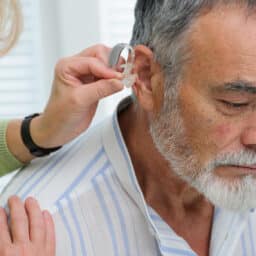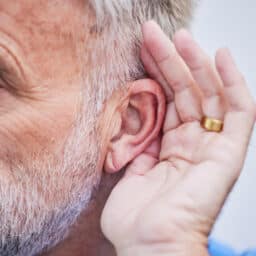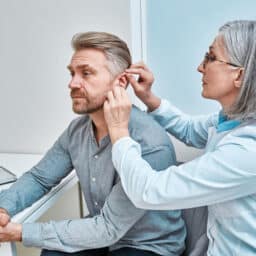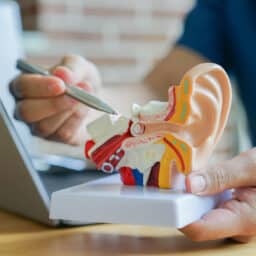Yard Care and Hearing Protection: How to Do Yard Work with Hearing Loss

With the arrival of autumn, yard work becomes a priority as you prepare for winter and manage the falling leaves. Many, however, forget that the tools used for tasks like mowing, leaf blowing and chainsawing can produce dangerously high noise levels, putting your hearing at risk. It’s essential to take steps to protect your ears…
Overcoming the Plugged-Ear Feeling From Hearing Aids

Have you ever covered your ears with your fingers and found that your voice sounds echoey or amplified? For people new to hearing aids, this plugged-up feeling and amplified noise can become a common occurrence. Let’s look at why this phenomenon occurs and what you can do to manage it. How Do Hearing Aids Cause…
What To Know About Ear Stroke

Sudden sensorineural hearing loss (SSHL), sometimes called an “ear stroke,” is a serious condition where an individual experiences a rapid decline in hearing, in either one or both ears. This loss can happen suddenly or develop over a few days. If not addressed quickly, it may lead to either temporary or permanent hearing loss. Knowing…
Don’t Ignore These Five Signs of Hearing Loss

Hearing loss is more common than you might think, affecting nearly 20% of the global population. Despite this prevalence, many people miss the early signs, often going years without seeking help. Recognizing the symptoms early on can make a significant difference in your quality of life. Here are five signs of hearing loss you shouldn’t…
How to Adjust to A Hearing Loss Diagnosis

Adjusting to a diagnosis of hearing loss can leave you unsure of your next steps, but there are effective strategies to help you navigate this transition and adjustment with confidence. Here are five tips to help you cope with hearing loss and enhance your quality of life: Consider Hearing Aids One of the most impactful…
Is It Time to Update Your Hearing Aids?

Hearing aids are crucial for enhancing the quality of life for individuals with hearing loss, with the potential for benefiting nearly 28.8 million Americans. Over time, however, like any technology, they can become less effective or outdated. If you’ve been using your hearing aids for a few years, you might be contemplating whether it’s time…
Tips For Talking on The Phone With Hearing Loss

Communicating on the phone can be challenging for individuals with hearing loss. It’s a relevant topic, as more than one in 10 individuals in the U.S. report some form of hearing loss. However, with the right strategies and tools, phone conversations with hearing loss can be quite manageable. Read along for some helpful tips for…
Common Audiology Questions and Their Answers

Navigating the world of audiology and hearing aids can raise many questions for those experiencing hearing loss or considering hearing aids for themselves or a loved one. Nearly 28.8 million Americans could benefit from hearing aids. To help shed light on some of the most common inquiries, here are answers to frequently asked audiology questions:…
Understanding the Implications of Ignoring Hearing Loss

Hearing loss affects approximately 15% of U.S. adults. While it may initially appear minor—like occasionally missing a word or phrase—it can significantly diminish your ability to communicate effectively with others. Recognizing and treating hearing loss is essential for enhancing your overall quality of life. Here’s what you need to know about the consequences of neglecting…
How Can Hearing Aids Restore Your Confidence?

Hearing loss is a widespread issue, with an estimated 28.8 million Americans who could potentially enhance their life experience by using hearing aids. A notable benefit that hearing aids offer is increased self-confidence for the wearer. The challenge of not being able to hear can often create a sense of isolation and erode confidence. If…
